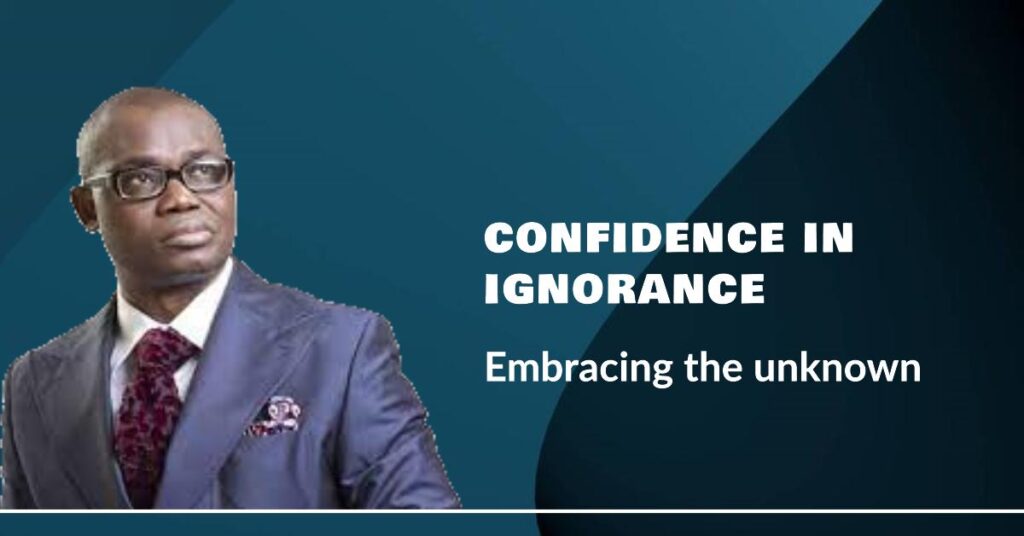Confidence in Ignorance: Lessons from Leke Alder
By the Numbers:
- 80% of new businesses survive their first year.
- 30% of businesses last for ten years.
- 45 is the average age of a successful startup founder.
- Businesses founded by people under 30 often fail due to lack of experience.
- 52% of business failures are due to a lack of a good team and illiquidity.
The Adventure of Starting a New Business
Starting a new business is akin to embarking on an adventure. Did you know that about 80% of new businesses manage to stay afloat during their first year? However, as time goes on, this number drops significantly. By the time a decade passes, only around 30% of those businesses are still around. Interestingly, successful startup founders are usually around 45 years old, showing that experience often plays a crucial role in long-term success.
One reason why businesses started by people under 30 sometimes struggle is their lack of experience. This is understandable since experience helps in navigating challenges and making wise decisions. Additionally, having a strong team and enough money to handle tough times are key factors in business survival. In fact, over half of business failures can be attributed to these issues, with problems like not having the right team or not having enough cash to keep going being common culprits.
Notable Business Failures
-
BlackBerry
Once a dominant force in the smartphone market, BlackBerry failed to adapt quickly to the changing landscape and lost ground to competitors like Apple and Android.
-
Nokia
Originally a rubber company, Nokia transitioned successfully into the communications industry but faltered when it started prioritizing design over technological innovation in its phones.
-
Kodak
Kodak famously struggled to embrace digital photography despite being a pioneer in the film industry. This failure to pivot ultimately led to its decline.
-
Enron
Enron’s collapse was due to unethical practices and accounting fraud, which eventually led to one of the largest corporate bankruptcies in history.

-
Blockbuster
Once synonymous with video rentals, Blockbuster failed to adapt to the rise of online streaming services like Netflix, leading to its decline and eventual bankruptcy.
Notable Business Failures
These companies faced various challenges that contributed to their downfall:
- Not Innovating Fast Enough:They didn’t keep up with new ideas and technologies, leading them to fall behind competitors who did.
- Character Deficits:Issues with leadership or ethical practices, like Enron’s fraud, eroded trust and stability.
- Complacency:Success can sometimes lead to comfort or overconfidence, causing companies to neglect changing market demands.
- New Technologies:Emerging technologies, like digital photography or online streaming, disrupted traditional business models, catching these companies off guard.
Leke Alder's Strategy: The Special Meal
Leke Alder’s talk delves into a fascinating strategy for nudging a guy into proposing to his long-term girlfriend. He starts by spotlighting the need for a female volunteer who’s been in such a relationship but hasn’t yet received the proposal she’s eagerly waiting for. To illustrate his approach, Alder homes in on the power of a carefully planned special meal. This isn’t just about cooking; it’s a strategic process that involves everything from ingredient selection and cooking techniques to setting the perfect ambiance and being attuned to feedback.
Leke Alder shares strategies for success in relationships and business, drawing parallels between them. He illustrates how preparing a special meal can prompt a proposal, emphasizing the importance of feedback for improvement. This process mirrors business concepts like input (ingredients), throughput (cooking), output (the meal), ambiance, and client feedback.
Alder meticulously outlines each step of this meal strategy. He categorizes them into stages: “input” for gathering ingredients, “throughput” for cooking and preparation, “output” for the final meal, “push foot” for creating the right setting, and “client” referring to the boyfriend. He underscores that success hinges on seamless execution across all these stages, with feedback acting as a compass for continuous improvement.
Interestingly, Alder draws parallels between this romantic strategy and core business concepts. He touches on the logic behind business ideas, emphasizing the need for robust systems and organization (akin to the “throughput” stage in the meal strategy). Just as feedback is pivotal in refining culinary skills, it’s equally crucial in the business realm for honing processes and achieving success.
Clear Communication in Business
Leke Alder emphasizes the importance of clear communication in business. He critiques the business cards of volunteers, pointing out the lack of specificity and clarity in their branding and business descriptions. He emphasizes the need for concise and descriptive language that resonates with potential clients, highlighting the importance of understanding and effectively communicating what one’s business truly offers.
Transitioning to organizational structures and efficiencies, Alder shares a personal anecdote about delivering results under challenging circumstances for a prestigious client. He stresses the significance of delivering tangible results to clients rather than just focusing on the efforts put in. He also discusses the difference between output, which is the natural result of activities, and products, which are what clients actually receive and value. Client feedback and appropriation are crucial in determining the true value of one’s output.
Alder invited three more volunteers to discuss their branding and logos. He offered feedback on how they could improve their visual representation and message to better connect with their target audience. Throughout the seminar, Alder underscored the importance of clear communication, client feedback, and delivering tangible value in business endeavors.
Key Takeaways for Business Success
- Clear Communication: Craft clear and compelling messages that align with your brand values and resonate with your target audience. Avoid jargon and overly complex language; simplicity and clarity are key.
- Client Feedback: Value client feedback to refine processes and deliver what clients truly want.
- Deliver Tangible Results: Focus on delivering tangible results rather than just putting in effort.
- Confidence in Ignorance: Sometimes, not knowing everything about a subject can lead to creative and successful outcomes. Have confidence in your abilities and creative ideas, even if you don’t have all the knowledge or experience initially.
Conclusion
Leke Alder’s insights emphasize the importance of clear communication, client feedback, and delivering tangible value in business endeavors. His concept of the “confidence of ignorance” highlights that taking risks, being creative, and having confidence in one’s abilities can lead to success. By paying attention to these key aspects, businesses can enhance their visibility, connect with their target audience, and ultimately achieve long-term success. So, have the confidence of ignorance and embark on your entrepreneurial journey with creativity and resilience!
Reference
Leke Alder – The Platform Nigeria – 2022 – https://youtu.be/5eBvFtx6ahw?si=_XdhCSwi7b2sBrFS



